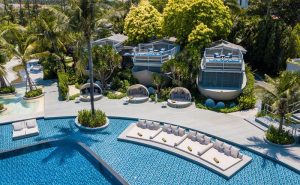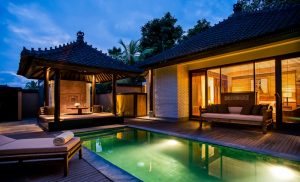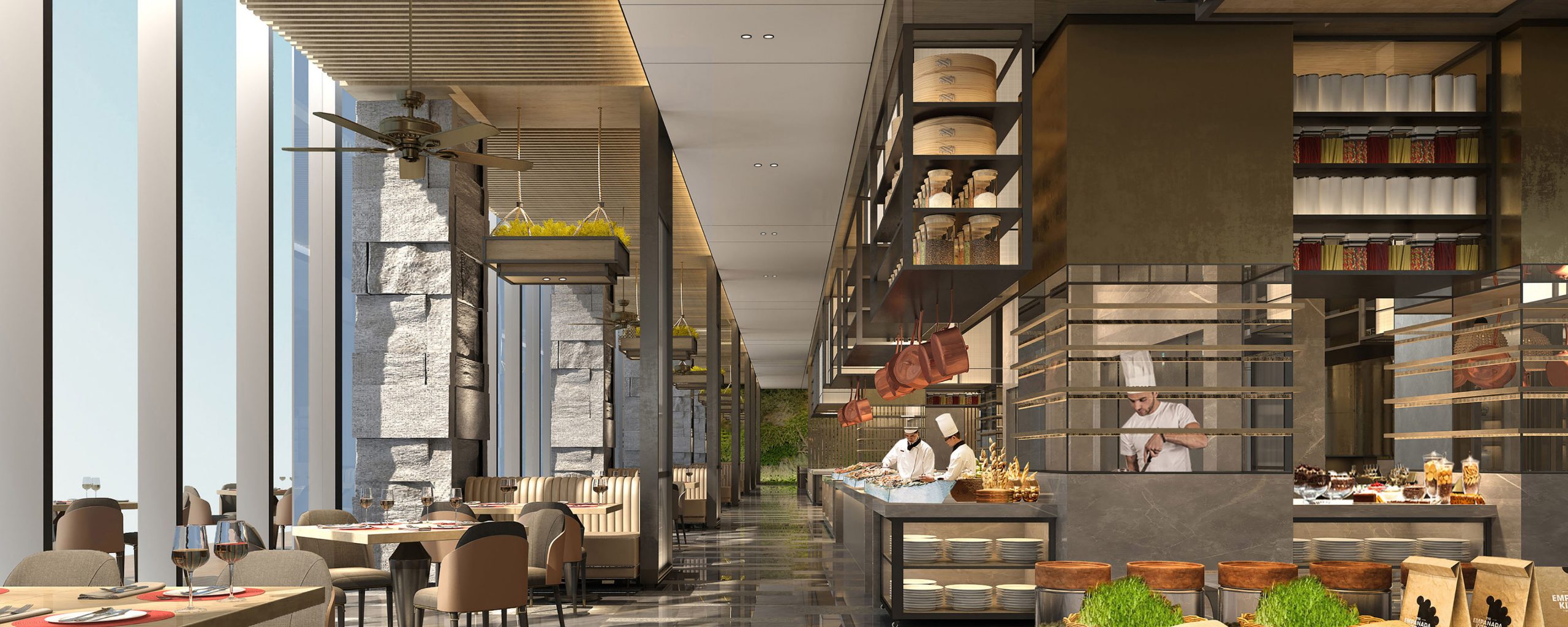While the hospitality industry may be suffering at the hands of Covid-19, hotel openings that have continued as planned attest to a level of hope and optimism around travel bouncing back.
Zentis Osaka
Zentis Osaka, the first hotel of a new hospitality brand, opened in July this year, right as travel came to a grinding halt as Covid-19 was making its presence felt the world over.
Top UK designer, Tara Bernerd, was tapped for the property’s modern interiors while Café Co. – the esteemed operator behind the one Michelin-starred CRAFTALE in Tokyo – developed and operates the hotel’s restaurant, bar and lounge. An entirely new build, the 16-storey property features 212 guestrooms with a contemporary feel that take inspiration from the intuitive functionality of bento boxes. T
he culinary direction of UPSTAIRZ, the hotel’s dining venue, is guided by the acclaimed head chef’s wealth of experience in France and Japan.
Zentis Osaka is situated where the picturesque, riverside area of Dojimahama and the high-end business entertainment district of Kita-shinchi meet. With its Q3 opening Zentis, was prepared to navigate a very different hospitality landscape than originally anticipated.
“Although we’re primarily looking to the domestic market at present, we know travelers will eventually return to Japan,” said Jun Yasui, GM of Zentis Osaka.

“Our country has always been a very safe and attractive destination and this is undoubtedly a pairing people will be looking for as they plan their trips abroad,” he added.
Alma Resort Cam Ranh
Alma Resort on Vietnam’s Cam Ranh Peninsula opened in May at the very height of the world’s anxiety over the coronavirus. Years in the making, the resort unveiled 580 oversized, ocean-view and ocean-front suites and pavilions, a broad spectrum of restaurants, a food court with an array of local and international cuisine, as well as a sports bar, pool bar and beach bar.
There were 12 swimming pools cascading down to the beach, a waterpark, 13-treatment room spa, 70-seat cinema, convention centre, amphitheater, art gallery, science museum, gymnasium and yoga room, 18-hole mini golf course, a youth centre with virtual reality games, a kid’s club, watersports centre and even an ‘Alma Mart’ mini supermarket.
In the wake of that locked down debut, pent-up domestic demand for travel in the wake of COVID-19 surged onto the resort’s shores. Fourteen thousand individual guests stayed in June and more than 15,000 in July.
“With the borders in Vietnam still closed to international travellers, we can’t believe how much demand there has been for travel in Vietnam by the Vietnamese, particularly families,” said Alma’s General Manager, Herbert Laubichler-Pichler.

“After so much dour news worldwide, to see the resort fill up this way has been more than encouraging as optimistic locals and expats explore their own backyard,” he added.
He also said that Alma’s two- and three-bedroom pavilions with large living and dining areas, kitchens and private pools had proven to be the most popular accommodations with guests due to ‘a perception of a home away from home that’s safer, where you don’t have to mix with others as much’.
Meliá Koh Samui
Two days before Meliá Koh Samui, the first property in Thailand launched under Spanish hotel group Meliá Hotels International, celebrated its grand opening on January 10 this year, the first suspected case of Covid-19 was detected in Thailand. This case was confirmed as the first outside of China three days after the luxury 159-room and 41-suite resort cut the ribbon on a lagoon pool that meanders through the resort’s grounds like a river, a two-level infinity pool with sunken seating, two restaurants, an executive lounge, a swim-up bar, lobby bar, spa, fitness center, ballroom and other MICE facilities and, for families, a kid’s club, outdoor playground and mini water park.
Paying homage to Koh Samui’s heritage as a safe haven for sailors and sea traders, the resort features merchant vessels more than 100 years old that have been repurposed as elegant two-story boat suites.
“Our owners Asset World Corporation retained all of the resort’s staff and ensured 100% of our salaries during the pandemic,” the resort’s general manager Ernesto Osuna said.

“Not only does this move ensure livelihoods; this investment in our team and associates is very far-sighted in that it really set our newly-opened resort on a positive trajectory for the long-term,” he added.
In addition to becoming more concerned about hygiene and social distancing, he said travelers are now more conscious of choosing a hotel or resort that helps people in need and cares for the environment as ‘the pandemic has proven to be a profound reminder of the significance of looking after each other and the planet’.
Tanah Gajah, a Resort by Hadiprana
As the world was tuning into the outbreak of coronavirus in Wuhan, Tanah Gajah was getting ready to open its doors as the first resort in a new group by Hadiprana. Moored among the rice paddies of Bali’s spiritual heart at Ubud, the idyllic 20-key property was once the private family estate of noted Indonesian architect Hendra Hadiprana.
After 20 years under management by GHM, this Leading Hotel of the World came back into the Hadiprana family’s fold in January this year. The resort’s extensive art and antique collection, collected over decades, remains a pillar of the property and strolling the grounds is an immersion in Balinese art and sculpture.
The secluded five-hectare estate features an indulgent spa that makes the most of the view, and a spacious swimming pool with mythic gajah (elephant) statues standing guard over the water. Rooms are in traditional Balinese style with semi-outdoor bathrooms and several with private plunge pools. A new dining destination, Panen Padi, with uninterrupted views of some of Ubud’s most iconic scenery, opened in February this year.
An impressive organic vegetable garden supplies the restaurant and, during Covid-19, a new garden has been planted with fast growing crops to provide food to the staff and their families. Despite the dramatic drop in tourism the Balinese resort is well-placed to meet the changing needs of travelers as they do start to welcome them back.
“We have noticed that boutique properties are preferred by travelers, not just because they are more conducive to social distancing but because they are more authentic and offer guests a unique experience,” said Deasy Swandarini, GM of Tanah Gajah.

“They are more personalized and able to adapt as guest needs and preferences during post-Covid-19 travels will vary,” she added.





